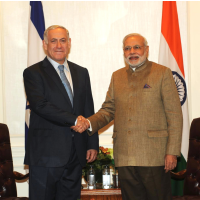Trade Blossoms Between India and Israel
 The prime ministers of Israel (left) and India (right) met in September after a gap of 11 years (photo: Facebook)
The prime ministers of Israel (left) and India (right) met in September after a gap of 11 years (photo: Facebook)
With Prime Minister Narendra Modi coming to power in May, the bilateral relationship between India and Israel as gone into overdrive. Two major defence deals have been signed in the past two months as both countries are moving ahead with a commercial and political relationship that is no longer burdened by the unease felt by the previous UPA government over the reaction of the country’s Muslim minority.
At the U.N. General Assembly in New York last September, Modi set aside time for a meeting with Israeli Prime Minister Benjamin Netanyahu, the first meeting between the two heads of government in over a decade.
That same month the NDA government cleared a long-delayed purchase of Israeli missiles for the Indian Navy. Then in October, India closed a $520 million deal to buy Israeli anti-tank missiles. And last week, a jointly developed aerial defence system passed a major trial, which India called a "milestone".
According to Bloomberg, India has bought 41 billion rupees ($662 million) of Israeli arms since Modi took power six months ago. That’s more than the total value of Israel’s defense exports to India in the prior three years.
"There is great momentum in cooperation, on both the defence and economic sides," Naftali Bennett, Israel's economy minister, told Reuters.
India is now the largest buyer of Israeli military equipment, while Israel is India's second largest arms supplier after Russia. In the first nine months of 2014, bilateral trade reached $3.4 billion, well on target for a record volume this year.
Modi is gung-ho about bilateral ties with Israel. In 2006, when Modi was chief minister of Gujarat, he had visited the Middle East to explore new ideas in irrigation, an area of Israeli expertise.
As a result, India started buying drip-feed technology, said Amnon Ofer, a friend of Modi's and chairman of NaanDanJain Irrigation, formed after India's Jain Irrigation acquired a firm created by two Israeli collective farms.
Under Modi's predecessor, Dr. Manmohan Singh, the government kept the growing relationship with Israel under wraps, partly so as to not upset the Muslim community, according to C. Raja Mohan, head of strategic studies at the Observer Research Foundation in New Delhi.
"Cynics in Israel would point out that Delhi was treating Tel Aviv like a mistress - engage in private but refuse to be seen with in public," Mohan told Reuters. "The Modi government is having none of that."
Both sides stand to gain from the relationship. Strategically, Israel is glad to have a rising Asian power as an ally. Asia is also about to overtake the United States as Israel's largest export market after the European Union.
India is buying Israeli defence and cyber-security technology to catch up with rival China. But for both countries the focus remains on business.
Cargo Motors is partnering Israel Ports Co. to build a deepwater port in Gujarat, and Jaiprakash Associates is teaming up with Israel's TowerJazz and IBM with plans to build a $5.6 billion chip plant near Delhi.
At a security conference in Tel Aviv last week, executives from top Indian firms were shopping for systems to secure their pipelines, refineries and other infrastructure.
According to the Times of India, the boom in activity has lead to expectations that India and Israel may soon finalise a free trade agreement that has been negotiated since 2010.
"That means trade will double or triple," Anat Bernstein-Reich, who chairs the Israel-India Chamber of Commerce, told Reuters.
That will come as good news for Modi, who was elected on the platform of re-energising India’s stagnant economy.
- Karan Singh
To Learn More:
Under Modi, Israel and India forge deeper business ties (by Tova Cohen and Ari Rabinovitch, Reuters)
Modi Revives India-Israel Ties as Terrorism Threat Grows (by N.C. Bipindra and Natalie Obiko Pearson, Bloomberg)
Expect India to pursue ties openly, says Israel (by Sagnik Chowdhury, The Times of India)
Reinvigorated Indo-Israeli military ties: The Modi phenomenon (by Alvite Singh Ningthoujam, Jerusalem Post)
- Top Stories
- Controversies
- Where is the Money Going?
- India and the World
- Appointments and Resignations
- Unusual News
- Latest News
- India College Chain’s Expansion into U.S. Draws Opposition from Massachusetts Officials over Quality of Education
- Milk Shortages in India Tied to Release of New Movies Featuring Nation’s Favorite Stars
- Confusion Swirls around Kashmir Newspaper Ban in Wake of Violent Street Protests
- Polio-Free for 5 Years, India Launches Vaccine Drive after Polio Strain Discovery
- New Aviation Policy Could Increase Service, Lower Ticket Prices






Comments